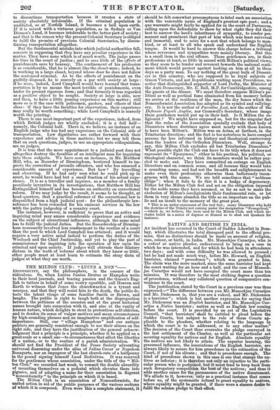THE MILTON CLUB: " LIJCITS A NON "—
Drcowantrrrv, say the philosophers, is the essence of the ridiculous. So, when Lucius Junius Brutus or Hampden write to their local journals, and tearing passion and the Queen's Eng- lish to tatters in behalf of some vestry squabble, call Heaven and Earth to witness that Jones the churchwarden is a tyrant and usurper, and that they will resist him to the death, the public de- tects the latent visage of some familiar Smith or Brown, and laughs. The public is right to laugh both at the disproportion between the pettiness of the occasion and at the great historical names brought into connexion with it, and also at the vanity of " human nature, which delights to strut in pretentious self-oblivion, and to deaden its sense of vulgar motives and mean circumstances by high-sounding phrases and an imaginative amplification of self- importance. Still our "village Hampdens" and our antique patriots are generally consistent enough to use their aliases on the right side and they have the justification of the general acknow- ledgment a principle is a principle, whether it be applied on a great scale or a small one—to circumstances that affect the liberties of a nation' or to the routine of a parish administration. We should not find the President of the Peace Society advocating universal disarming. under the alias of Julius Ctesar or Napoleon Bonaparte, nor an impugner of the last church-rate of a halfpenny in the pound signing himself Laud Redivivus. It was reserved for the gentlemen whose association, under the title of the "Mil- ton Club," we recorded last week, to commit the double absurdity
of mounting themselves on a pedestal which elevates them into pigmies, and of adopting a name for their association in flagrant "nonconformity" to the principle on which it is based.
The Milton Club is an association of Nonconformists, for united action in aid of the public purposes of the various sections of which it is composed. Even were this a complete statement, it should be felt somewhat presumptuous to label such an association with the venerable name of England's greatest epic poet ; and a quo warrant° might fairly be applied for in the court of Parnassus, calling upon the defendants to show by what right they did their best to narrow the bard's inheritance of sympathy, to render per- manent and prominent that part of him which was least universal and immortal, and to seize for a sect that which belongs to man- kind, or at least to all who speak and understand the English tongue. It would be hard to answer this charge before a tribunal whose reverence and sympathies were mainly literary. But this is a small item in the real offence. These gentlemen are, in their professions at least, as little in accord with Milton's political views, as they seem to be tender and reverent towards the national senti- ment which would protest against looking on him at all in these days as a party man. To say nothing of the great bulk of Dissent- ers in this country, who are supposed to be loyal subjects of Queen Victoria, and not Republicans waiting upon Providence, we notice that distinguished supporter of Lord Derby, the Minister of the Anti-Democracy, Mr. E. BO, M.P. for Cambridgeshire, among the guests at the dinner. We must therefore suppose Milton's po- litical as well as poetical fame eliminated from his memory before we arrive at the residuum of the man, the dry bones which the Nonconformist Association has adopted as its symbol and rallying cry. It is not the author of Paradise Lost, nor the author of the Defensio Populi Anglia, nor Cromwell's Secretary, whose image these gentlemen would put up in their hall. Is it Milton the re- ligionist P We might have supposed so, but for the singular fact that the rules of the Association specially exclude that body of Dissenters whose doctrines agree most nearly with those known to have been Milton's. Milton was an Arian, at farthest, in the Trinitarian direction; and the fact is too notorious to have escaped persons far less informed in history and theological controversy than the leaders of the Orthodox Dissenters. Well, strange to say, this Milton Club excludes all but Trinitarian Dissenters.* What possible right the Club can have to its title when it does not represent its " Eponymns," either in his poetical, his political, or theological character, we think its members would be rather puz- zled to make out. They have committed an outrage on English literature and on common sense, and all because they would take a sounding name, and had not the breadth and enlightenment to make even their professions otherwise than ludicrously incon- gruous with the name. We are told sometimes that "noblesse oblige" : when it fails to do this it is a badge of degeneracy. Either let the Milton Club feel and act on the obligation imposed by the noble name they have assumed, so far as not to make the exclusion of Milton's eoreligionists their fundamental rule, or let them in very shame abandon the title as an imposture on the pub- lic and an insult to the memory of the great poet. * This is an under-statement of the real fact ; many Dissenters who hold the doctrine of the Trinity not coming under the designation "Evangelical," —which is, we believe, the term used by the Milton Club, and which in- cludes belief in a series of dogmas so framed as to shut out Quakers for instance.


























 Previous page
Previous page